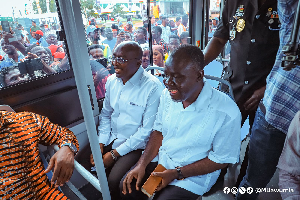Accra (Greater Accra) 22 December 2001 - The Trades Union Congress (TUC) in collaboration with the Media Foundation for West Africa (MFWA) would early next year organise a workshop to train Journalists interested in Labour reporting.
The programme is designed to introduce journalists to covering labour and labour-related issues "to put an end to the stereotyped media concentration on red arm bands and strikes that are only a small aspect of the reality of labour and labour relations".
Speaking at a meeting with journalists on Friday, the TUC Secretary General, Mr Kofi Adu-Amankwa, said land and capital were more recognised and enjoyed greater legitimacy than labour.
He said the three formed the factors of production, adding that labour should be accorded due recognition to avoid agitation and conflict.
He said the training course would enhance the journalists' techniques of reporting and analysing labour issues better and help them to focus more on what was being done and not just on what people said.
Mr Adu-Amankwa said it would also enhance journalists' understanding of labour as an organised institution, comprising workers' associations and organisations, working classes and working people and their relationship to their work, employers, government and the international system of politics.
"This implies coverage of working people at the so-called formal and informal levels, at organised and un-organised or spontaneous levels, at the national, regional and international or global levels."
He said unless the society made an effort to recognise labour, greed, exploitation, discrimination and poverty would continue to dominate society.
This was why the International Labour Organisation (ILO) since 1919, has set standards and laws for labour and given it the necessary recognition, Mr. Adu-Amankwa said.
"We need special intervening ideas to change attitudes and reform how we address issues of labour and help society to promote equality, solidarity and objectivity in respect to labour."
Mr Adu-Amankwa said there was a big problem of education in the country as many people did not know their human rights basically because most agreements and policies were written in English that most people, providing casual labour could not understand.
He said the TUC would soon start mass education on labour issues through the radio and television in the local dialects. This, he said would make a greater impact than organising seminars in which only a few people benefit.
Mr Kwame Karikari, Executive Director of Media Foundation For West Africa, said the economic situation of Ghana promotes the agitation process of workers most of whom had little or no skills and could easily be dispensed of the moment they start to fight for their rights.
"In a weak state, it is always the poor and unprotected who suffer,'' he said, adding that workers in the rural areas, the agricultural sector and casual workers needed to be protected.
He said workers should be educated against attacking journalists in the performance of their duties.
General News of Saturday, 22 December 2001
Source: --
















